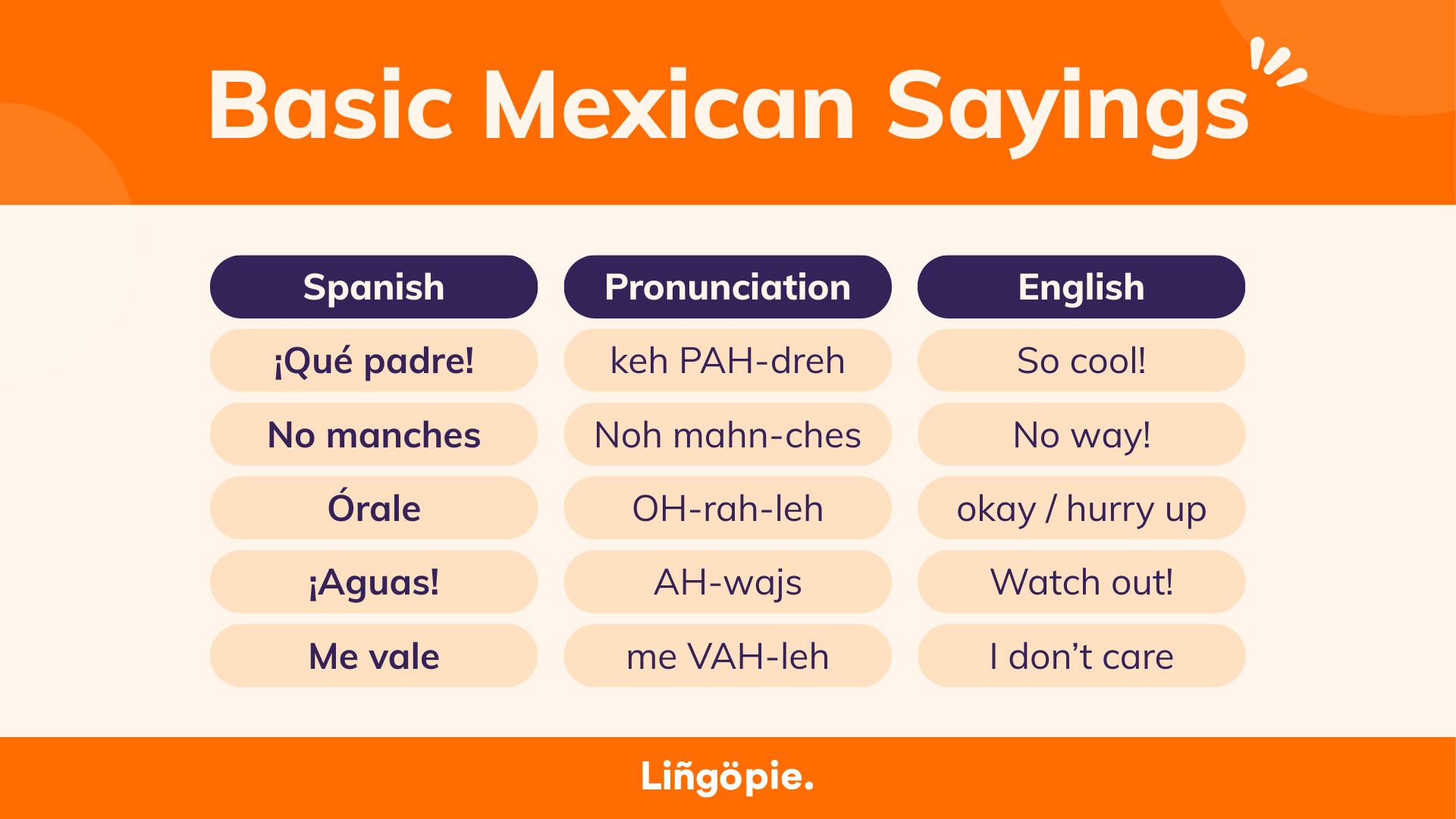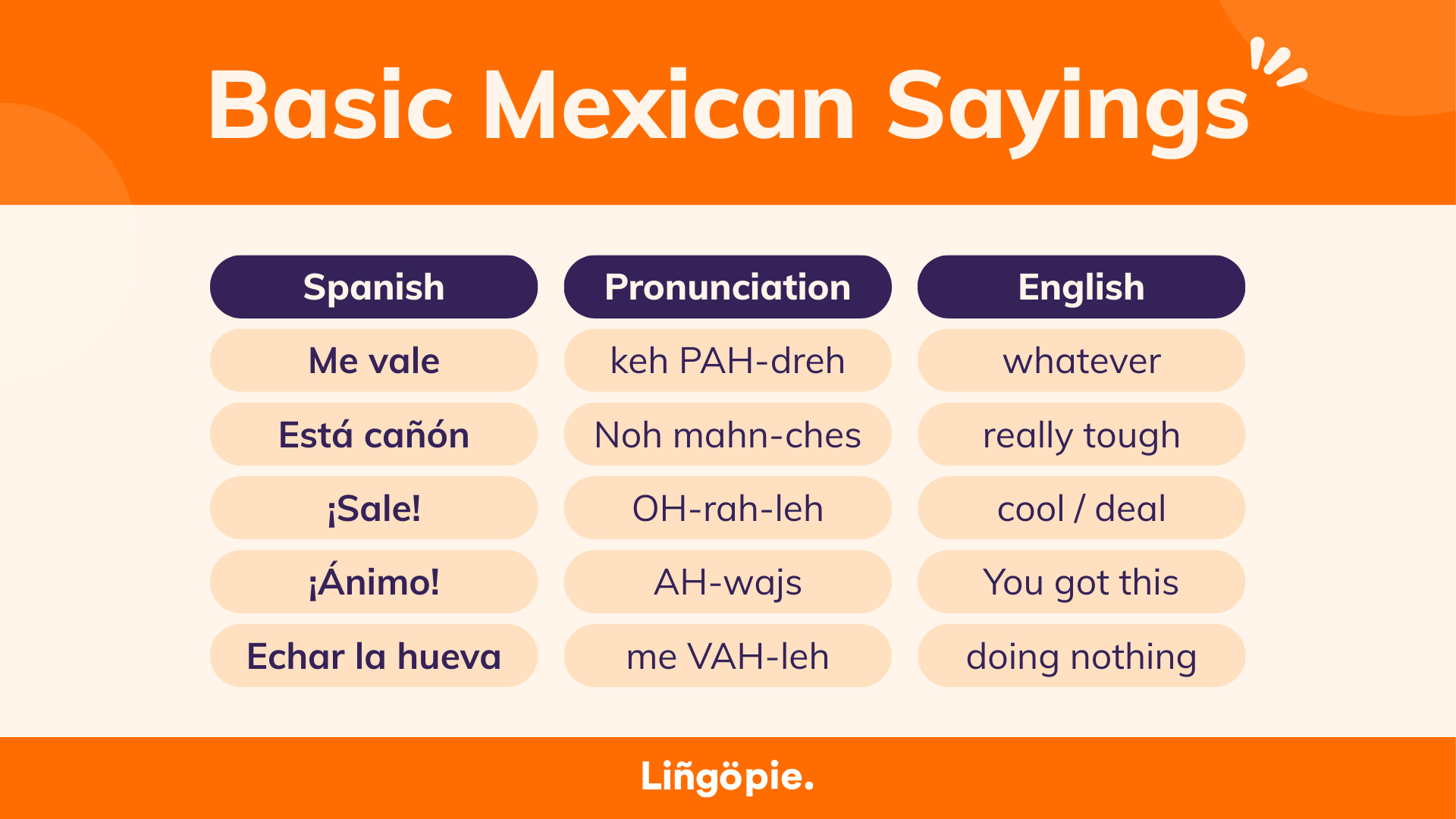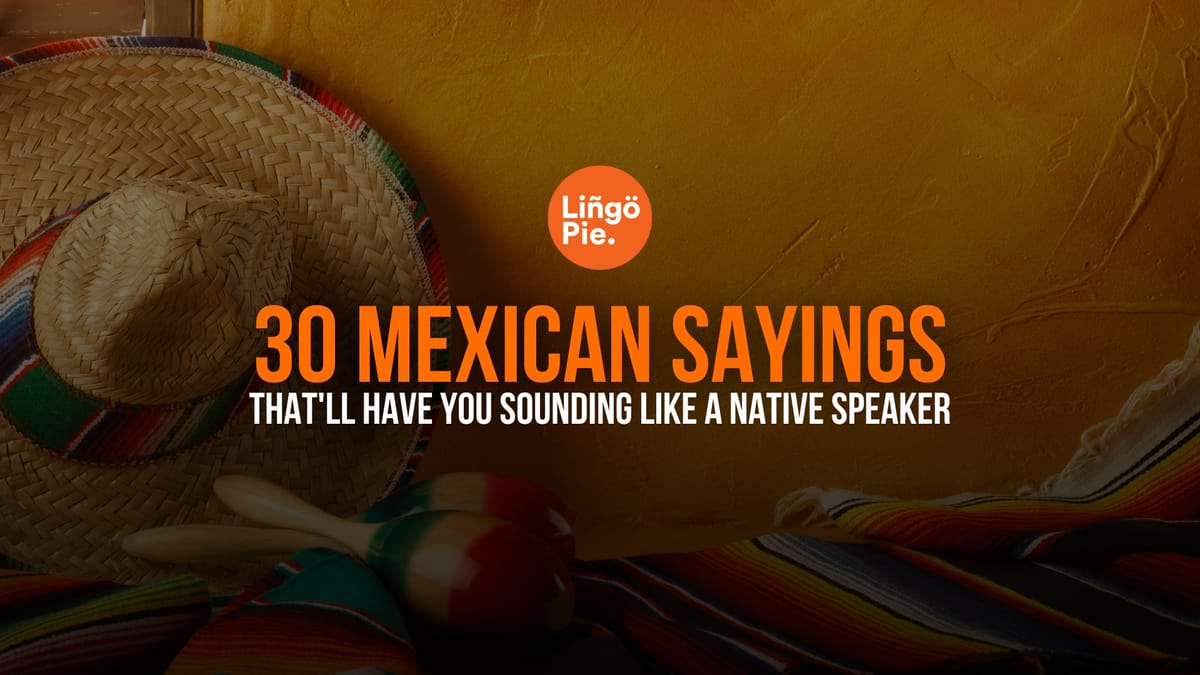Spanish isn’t just one language—it’s a collection of different accents, expressions, and unique phrases that change drastically depending on where you are. What makes perfect sense in Spain might get you blank stares or laughs in Mexico. That’s because Mexican Spanish has its own rich character, shaped by indigenous languages, historical events, and everyday culture that you won’t find anywhere else.
In this post, we’ll introduce you to the most popular and useful Mexican sayings, quotes, and proverbs that locals use daily. You’ll learn when to drop these expressions into conversation, what they actually mean (hint: it’s rarely literal!), and why using them will instantly boost your Spanish from “obviously foreign” to "surprisingly authentic."
- 25 Dominican Slang Terms You Gotta Know
- 24 Easy Honduran Slang You Should Learn From The Locals
- 24+ Easy Cuban Slang Words That Only Locals Understand

Basic Mexican Sayings
1. ¡Qué padre!
This one’s your go-to phrase for expressing excitement or admiration. You’ll hear it everywhere in Mexico — from teenagers hyped about a concert to abuelas reacting to their grandson’s new job. It’s the Mexican way of saying “That’s awesome!” or “So cool!”
Use it when: Someone shows you photos from their trip, or you’re genuinely impressed by something.
🗣️ “¿Viste mi nuevo coche?” — “¡Qué padre!” → “Did you see my new car?” — “That’s awesome!”
2. No manches
This one is a classic. It literally means something like “don’t stain” (yep, weird), but it’s used as “No way!”, “Are you serious?”, or even “Come on!” It can be shocked, funny, annoyed, or dramatic — totally depends on your delivery.
Use it when: Something surprising, annoying, or unbelievable happens — your friend is late again, or someone just dropped a wild piece of gossip.
🗣️ “Me cortó por mensaje…” — “¡No manches!” → “He dumped me by text…” — “No way!”

3. Órale
One word, infinite vibes. Depending on tone, "órale" can mean “let’s go,” “wow,” “okay,” or even “hurry up.” It’s like the Swiss Army knife of Mexican reactions — you’ll hear it in markets, taxis, with friends, or even in movies.
Use it when: You’re reacting to something surprising or trying to get someone to move. Bonus points if you say it with attitude.
🗣️ “Ya casi terminamos.” — “¡Órale!” → “We’re almost done.” — “Alright, let’s go!”
4. ¡Aguas!
This is Mexico’s version of “Heads up!” or “Watch out!” It comes from old times when people used to shout “¡Aguas!” before throwing dirty water into the street (true story). Now, it’s used anytime there’s sudden danger or something sketchy going down.
Use it when: You’re warning someone about a car, a spill, or even a shady person walking up.
🗣️ “¡Aguas con ese escalón!” → “Watch out for that step!”
5. Me vale
Okay — tread lightly with this one. It means “I don’t care,” and while it’s common, it can come off rude or blunt if not delivered carefully. Sometimes it’s used playfully, like “whatever,” but in other cases, it’s full-on dismissive.
Use it when: You’re talking to friends, joking around, or just being honest about not giving a damn — but avoid it in formal or tense situations.
🗣️ “Te critican mucho.” — “Me vale.” → “They criticize you a lot.” — “I don’t care.”
6. Está cañón
This phrase means something is really tough, intense, or wild — like “man, that’s rough” or “this is no joke.” It can apply to anything from a hard exam to a breakup to crazy weather. “Cañón” literally means “cannon,” so the vibe is: this situation hits hard.
Use it when: You're venting or reacting to a difficult or intense moment.
🗣️ “¿Ya viste cuánto cuesta el vuelo?” — “¡Está cañón!” → “Did you see how much the flight costs?” — “That’s insane!”
7. Chido
This is another way to say “cool”, and it’s very commonly used among younger people. It feels relaxed, chill — like the Mexican version of “dope” or “nice.” It’s used to describe anything you like: clothes, people, plans, food.
Use it when: You want to casually compliment something or agree in a laid-back way.
🗣️ “Vamos a una fiesta el viernes.” — “¡Chido!” → “We’re going to a party Friday.” — “Nice!”

8. ¡Sale!
Think of this as the Mexican way of saying “cool,” “deal,” or “sounds good.” It’s a quick way to agree to plans or wrap up a conversation. You’ll hear it constantly in Mexico — in stores, at work, even in casual texting.
Use it when: You’re agreeing to something or giving the green light.
🗣️ “Nos vemos a las ocho, ¿va?” — “¡Sale!” → “See you at 8, cool?” — “Deal!”
9. ¡Ánimo!
This one’s full of heart. It’s what people say when they want to lift your spirits — kind of like “Cheer up,” “You got this,” or “Hang in there.” You’ll hear it during tough times, at the gym, before an exam, or after a breakup. It’s simple, but feels sincere.
Use it when: Someone’s going through something tough or needs encouragement.
🗣️ “No pasé el examen.” — “¡Ánimo! La próxima vez lo lograrás.” → “I didn’t pass the test.” — “Cheer up! You’ll get it next time.”
10. Echar la hueva
This one is pure Mexican mood. It literally means something like “to throw the laziness”, but it's used to say you’re doing absolutely nothing — on purpose. Think of it as being a couch potato, chilling, or fully embracing your lazy day.
Use it when: You’re unapologetically being unproductive and loving it.
🗣️ “¿Qué hiciste hoy?” — “Nada, estuve echando la hueva.” → “What did you do today?” — “Nothing, I was just being lazy.”
Mexican Proverbs
Proverbs, or refranes in Spanish, are short, traditional sayings that convey wisdom passed down through generations. These sayings often reflect cultural values, offering practical advice for everyday situations. In Mexican culture, proverbs serve as reminders of important life lessons, from seizing opportunities to maintaining resilience in tough times. They capture the essence of communal knowledge, blending humor with guidance.
- “Camarón que se duerme se lo lleva la corriente.”
Translation: "A shrimp that falls asleep is swept away by the current."
Meaning: This proverb warns against complacency. It encourages people to stay alert and proactive, reminding us that inaction or carelessness can cause us to miss important opportunities. - “Dime con quién andas y te diré quién eres.”
Translation: "Tell me who you walk with, and I’ll tell you who you are."
Meaning: This saying highlights the influence of one’s social circle on personal identity. It suggests that the company we keep reflects our character, emphasizing the importance of choosing friends wisely. - “Al mal tiempo, buena cara.”
Translation: "In bad times, put on a good face."
Meaning: In difficult circumstances, this proverb encourages resilience and positivity. It reminds us that maintaining a good attitude, even in adversity, can make challenges easier to bear. - “Más vale tarde que nunca.”
Translation: "Better late than never."
Meaning: This proverb emphasizes that it’s better to achieve something late than to never do it at all. It encourages persistence and action, no matter how delayed. - “El que madruga, Dios lo ayuda.”
Translation: "God helps those who rise early."
Meaning: Early risers are often rewarded with success. This proverb stresses the value of hard work and diligence, especially when it comes to starting the day early. - “Haz bien y no mires a quién.”
Translation: "Do good and don’t look at whom."
Meaning: This proverb encourages kindness and generosity, regardless of who the recipient is. It emphasizes the importance of doing good deeds selflessly.
Mexican Quotes
Throughout history, many notable Mexicans have shared powerful and thought-provoking quotes that continue to resonate across generations. These quotes often reflect the deep cultural pride, revolutionary spirit, and artistic passion of Mexico.
Here are a few quotes from iconic figures that capture the essence of Mexican thought and identity:
“Pies para qué los quiero si tengo alas pa’ volar.” – Frida Kahlo
Translation: "Feet, what do I need them for if I have wings to fly?"
Meaning: Known for her indomitable spirit despite her physical suffering, Frida Kahlo used this quote to express the freedom of the mind and soul, regardless of physical limitations. It’s a powerful reflection of her resilience and boundless creativity.
“Es mejor morir de pie que vivir toda una vida arrodillado.” – Emiliano Zapata
Translation: "It is better to die standing than to live a life on your knees."
Meaning: Emiliano Zapata, a leader of the Mexican Revolution, spoke these words as a call for freedom and justice. This quote embodies the revolutionary spirit and the value of fighting for one’s rights, even in the face of adversity.
“La patria es impecable e inmortal, pero no es invulnerable.” – Octavio Paz
Translation: "The homeland is impeccable and immortal, but it is not invulnerable."
Meaning: Octavio Paz, a Nobel Prize-winning poet and essayist, reminds us that while a nation can be seen as enduring and perfect, it remains fragile and susceptible to threats. This quote speaks to the need for vigilance and care in preserving the values of one’s homeland.
“Donde no puedas amar, no te demores.” – Frida Kahlo
Translation: "Where you cannot love, do not linger."
Meaning: Another profound statement from Frida Kahlo, this quote advises people to move away from spaces or relationships that do not nurture love. It highlights the importance of love and passion in living a fulfilled life.
“El respeto al derecho ajeno es la paz.” – Benito Juárez
Translation: "Respect for the rights of others is peace."
Meaning: This famous quote from Benito Juárez, a beloved Mexican president, emphasizes the importance of mutual respect for achieving peace and harmony in society.
Mexican Colloquial Sayings
Colloquial sayings, or dichos populares, are informal expressions commonly used in everyday Mexican conversations to convey shared experiences, emotions, and practical wisdom. These sayings often carry a humorous or light-hearted tone, making them relatable and easy to remember. They reflect the attitudes, humor, and perspective of Mexican culture, offering insights into how Mexicans navigate life’s ups and downs. Whether offering comfort, motivation, or just a witty observation, these dichos are an essential part of casual communication.
- “No hay mal que por bien no venga.”
Translation: "There’s no bad that doesn’t bring some good."
Meaning: This saying encourages optimism, emphasizing that even in the face of misfortune, something good can come out of it. It’s a reminder to look for the silver lining in every situation. - “Más vale tarde que nunca.”
Translation: "Better late than never."
Meaning: Similar to the proverb, this saying encourages people to take action, even if it’s delayed. It emphasizes that achieving something late is still better than not doing it at all. - “A darle que es mole de olla.”
Translation: "Let’s get to it; it’s mole in the pot."
Meaning: This expression is used to motivate someone to get started on something quickly. Mole de olla is a slow-cooked Mexican stew, so the saying humorously suggests that just like the stew, some things need immediate attention before they’re ready. - “El que mucho abarca, poco aprieta.”
Translation: "He who grabs too much, squeezes little."
Meaning: This saying advises not to take on more than you can handle, as doing too much at once often leads to poor results. It’s a reminder to focus on quality over quantity. - “Cada quien con su cada cual.”
Translation: "To each their own."
Meaning: This expression promotes respect for different tastes and preferences. It’s a way of acknowledging that everyone has their own way of doing things or making choices, and that’s perfectly fine. - “O te calmas o te calmo.”
Translation: "Either you calm down, or I’ll calm you down."
Meaning: Often said in a playful or teasing way, this phrase is a humorous way to tell someone to relax or stop being agitated, usually in a family or friendly setting.
How To Use Mexican Sayings In Everyday Conversations?
- Start Small: Begin by learning a few simple sayings that are easy to remember and relevant to your conversations. “Más vale tarde que nunca” ("Better late than never") is a great example of a versatile saying you can use in many situations, like arriving late to a meeting or completing a task at the last minute.
- Listen and Observe: Pay attention to how native speakers use these sayings in different contexts. Listen for common expressions in casual conversations, TV shows, or even social media. This will help you understand when and how to use the sayings more naturally.
- Practice in Low-Stakes Situations: Incorporate sayings in informal settings with friends or people familiar with the language. If you’re unsure about how to use a saying, it’s okay to ask for feedback, which can help you refine your understanding.
- Match the Tone: Pay close attention to tone. Some sayings are used humorously (“A darle que es mole de olla” – "Let’s get moving") while others may be used for more serious advice or wisdom (“Dime con quién andas y te diré quién eres” – "Tell me who you walk with, and I’ll tell you who you are"). Make sure the tone of your conversation fits the message you're trying to convey.
- Context Matters: While many Mexican sayings are universal in meaning, they may have cultural nuances that affect how they’re perceived. For instance, “Cría cuervos y te sacarán los ojos” (Raise crows, and they’ll peck your eyes out) is a warning against betrayal, but using it in a lighthearted or sarcastic way with close friends can add humor. However, it would be inappropriate in a formal setting. Understanding the context in which these sayings are used is key to delivering the right message.
Top Mexican Sayings to Sound Like a Local
1. Camarón que se duerme, se lo lleva la corriente
This one means “the shrimp that falls asleep gets carried away by the current.” It’s a fun reminder to stay sharp — if you get lazy, you lose your shot. Locals use it to nudge a friend who’s procrastinating or missing out on something obvious.
2. Más vale tarde que nunca
Literally “better late than never,” this classic works in almost any setting. You use it when you show up late but still want credit for making the effort. It’s lighthearted, honest, and totally Mexican in tone.
3. Al mal tiempo, buena cara
The literal translation is “to bad weather, a good face.” It means you should stay positive when things go wrong. People use it to lift spirits — like saying, “Keep smiling even if it rains.”
4. El que madruga, Dios lo ayuda
This saying means “God helps those who wake up early.” It’s all about discipline and initiative. Mexicans use it to praise people who get up early or to guilt those who sleep in too long.
5. A falta de pan, tortillas
Translated as “if there’s no bread, use tortillas,” this saying celebrates flexibility. When life doesn’t go as planned, you adapt and move forward. It’s a perfect reflection of Mexico’s creative, resourceful spirit.
6. No hay mal que por bien no venga
This means “there’s no bad that doesn’t bring some good.” It’s an optimistic way to say every problem hides a silver lining. Mexicans use it to comfort someone after a setback — because something better is usually coming.
7. El que mucho abarca, poco aprieta
Literally “the one who grabs too much holds little.” It warns you not to take on more than you can handle. When someone’s juggling too many tasks, this is the go-to way to remind them to slow down and focus.
8. Ya salió el peine
This translates to “the comb came out,” and it means the truth finally surfaced. You’ll hear it when someone’s secret, mistake, or hidden motive becomes obvious. It’s short, funny, and full of attitude.
9. Ponerle mucha crema a tus tacos
Meaning “to put too much cream on your tacos,” this one’s about bragging or exaggerating. Use it when someone’s making themselves look better than they are — like saying, “You’re hyping yourself up too much.”
10. Más vale pájaro en mano que ciento volando
It means “better a bird in hand than a hundred flying.” In simple terms, be happy with what you’ve got. Mexicans use it to remind you not to risk something certain for something uncertain.
Ready to Sound Like a Local?
You’ve got the sayings — now it’s time to hear them in action. The best way to master Mexican dichos isn’t from a list, it’s from real voices, real laughter, and real conversations. On Lingopie, you can watch Mexican shows and movies where locals use these phrases naturally — no boring drills, just Spanish the way people actually speak it.
So don’t just memorize “Ni modo” or “Ponerle crema a tus tacos.” Watch how they come to life on screen, laugh along, and start using them yourself.
Learn Spanish the fun way with Lingopie.







![19 Best Spanish Series For Learning Spanish Fast [2026]](/blog/content/images/size/w300/2025/04/best-shows-to-watch-to-learn-spanish.jpg)
![How to Learn Spanish with News in Easy Spanish [Guide]](/blog/content/images/size/w300/2024/12/How-to-Learn-Spanish-with-News-in-Easy-Spanish.jpg)
![80 Spanish Love Words Every Romantic Should Know [Guide]](/blog/content/images/size/w300/2025/10/spanish-love-words.jpg)
